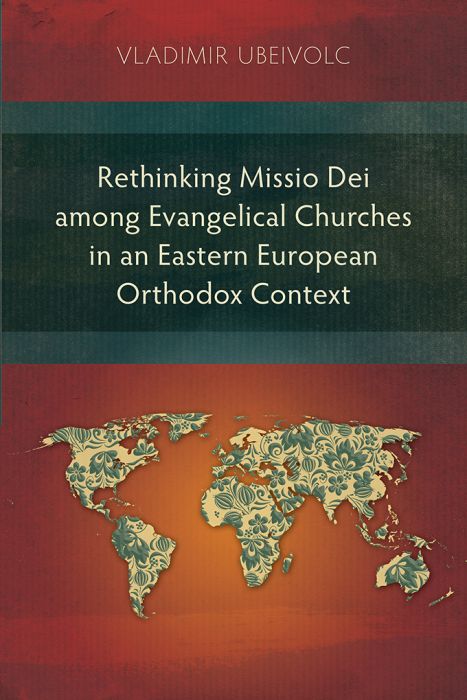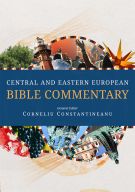| ISBN: | 9781783681044 |
|---|---|
| Imprint: | Langham Academic |
| Format: | Paperback |
| Dimensions (mm): | 229 x 152 x 18 |
| Publication Date: | 30/09/2016 |
| Pages: | 338 |
| Series: | Studies in Missiology |
| Language: | English |

Rethinking Missio Dei among Evangelical Churches in an Eastern European Orthodox Context
Following a paradigm shift in his own personal understanding of mission, Vladimir Ubeivolc proposes the adoption of mission principles based on missio Dei to meet the social and spiritual needs of people in Moldova. Biblically grounded and insightful, the lessons to be learned from this book apply far beyond Eastern Europe.
Dr Ubeivolc uses his knowledge from six years of research, twenty years of pastoral ministry and a lifetime of experience to summarize the landscape of the Moldovan Evangelical and Orthodox churches and their historical approaches to mission. His evaluation emphasizes the need for a biblical foundation to mission for Eastern European Evangelical churches.
This book’s message is a timely, scholarly reminder of the need to pursue holistic mission if the church of Jesus Christ is to be an authentic and effective vessel to bring transformation to people’s lives and society.
Endorsements
Dr Ubeivolc’s book is an excellent introduction to mission theology and practice in the Eastern European Post-Soviet setting. Based on solid academic reflections and expert knowledge of the evangelistic practices of Christian churches encountering each other in mission, the book offers invaluable insights into the missiological conceptualizations and paradigms of mission engagement in a culturally Orthodox context.
Parush R. Parushev
Senior Research Fellow,
International Baptist Theological Study Centre, Amsterdam
The concept of missio Dei has not been well known in the context of the former Soviet Union. Vladimir Ubeivolc has presented it here not only as a key concept for mission, but also as a central point at which the evangelical and orthodox dialogue can take place. As mission has often been a divisive issue between the different traditions, this research is a turning point and marks out a better way of understanding and appreciating each other in light of the mission of God.
Peter Penner
Director of Advanced Studies, Professor for Mission and New Testament,
Haus Edelweiss Campus, TCM International Institute
Table of Contents
- Abstract
- Acknowledgements
- Abbreviations
- Introduction
- Purpose and Motivations of the Current Dissertation
- Situation in Moldova
- Situation in the Union of Evangelical Christian Baptist Churches
- Definition of the Basic Conceptual Apparatus
- Missio Dei
- Evangelical Churches
- Eastern European Orthodox Context
- Overview of the Presented Dissertation
- Expected Results
- Chapter 1
- The Birth and Development of Evangelical Churches in Moldavian Orthodox Context
- The Emergence of Christianity in the Territory of Moldova
- The Emergence of Orthodoxy in the Territory of Moldova
- The Emergence of the First Non-Orthodox Groups
- Communities of Molokans
- Mennonite Communities
- Evangelical Communities
- Baptist Communities
- General Overview and Conclusions
- The Growth of Evangelical Churches in Moldova in the Period (1918–1944)
- Self-identification of Moldavian Evangelical Baptists
- New Challenges
- The Growth of Evangelical Churches in the Soviet Period (1944–1991)
- Evangelical Churches in Stalin’s Time
- Evangelical Churches in Khrushchev’s Time
- Evangelical Churches in Brezhnev’s Time
- Evangelical Churches in Gorbachev’s Time
- Conclusions
- Chapter 2
- Mission of Evangelical Churches in Moldova from the End of the Twentieth to the First Decade of the Twenty-First Century
- Religious Situation after Collapse of the USSR Block
- Evangelistic Crusades and Church Growth in Independent Moldova
- Theological Reflections in the ECB Union
- Conclusions
- Chapter 3
- Contemporary Relationships between Evangelicals and the Orthodox Church
- The Orthodox Church in Moldova in the Early 21st Century
- Proselytism and Foundations for Conflict between Evangelicals and the Orthodox Church
- Overview of the Moldavian Situation
- Theological and Ideological Foundations for Conflict
- Canonical Territory and the Ecumenical Movement
- “Aggressive” Evangelism
- Evangelical-Orthodox Dialogue in Moldova in the Early 21st Century
- Conclusions
- Chapter 4
- How “Mission” is Perceived by Evangelical Theologians
- Managerial Missiology
- Post-Imperial Missiology
- An Anabaptist Missiology
- Conclusions
- Chapter 5
- How “Mission” is Perceived by Orthodox Theologians
- The Foundation and Content of Orthodox Mission
- Kenosis as an Incarnated Method of Orthodox Mission
- Theosis as the Final Goal of Orthodox Mission
- Conclusions
- Chapter 6
- How “Mission” is Perceived in Ecumenical Circles
- Missio Dei as an Ecumenical Paradigm
- The Content of Missio Dei
- The Goal of Missio Dei
- Conclusions
- Chapter 7
- The Trinitarian Foundation for Mission
- Mission of the Father
- Mission of the Son
- Mission of the Spirit
- Conclusions
- Chapter 8
- Analytical and Synthetic Evaluation of the Missiological Paradigms
- Distinctions and Similarities in Different Missiologies
- Orthodox Missiology vis-à-vis the Church Growth Movement
- Orthodox Missiology vis-à-vis the Lausanne Movement
- Orthodox Missiology vis-à-vis the Anabaptist Movement
- Orthodox Missiology vis-à-vis the Ecumenical Movement
- Comparative Analysis of All Paradigms
- Mission of the Orthodox Church vis-à-vis the Mission of ECB in Moldova
- Mission of the Church – Synthetic Dynamics for the Whole Church
- Conclusions
- Chapter 9
- Holistic and Cooperative Approach in Mission
- Biblical, Theological and Practical Aspects for Holistic Mission in Moldova
- Social Responsibility and Social Action
- Prophetic Presence
- The Relationship between the Prophet and Social Problems in the Bible
- Prophets and Social Activity Nowadays
- Evangelism or Witness?
- Mission as Dialogue and Common Witness
- Common Witness in Soviet Time
- Common Witness in Contemporary Neighboring Countries
- General Situation in Ecumenical Circles
- New Paradigm for Evangelical Churches in Moldova from a Missio Dei Perspective
- Conclusions
- Conclusion
- Bibliography
- Primary Sources
- Books and Monographs
- Articles, Essays and Component Parts within Books
- Theses and Dissertations
- Electronic Sources
- Interviews
- Web Sources





